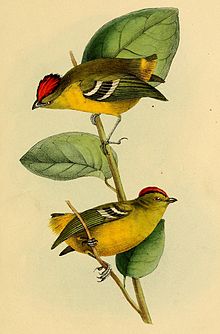Kinglet calyptura
| Kinglet calyptura | |
|---|---|
 |
|
| Kinglet calyptura illustrated by William John Swainson | |
| Scientific classification | |
| Kingdom: | Animalia |
| Phylum: | Chordata |
| Class: | Aves |
| Order: | Passeriformes |
| Family: | Tyrannidae |
| Genus: |
Calyptura Swainson, 1832 |
| Species: | C. cristata |
| Binomial name | |
|
Calyptura cristata (Vieillot, 1818) |
|
| Synonyms | |
|
Pardalotus cristatus Viellot, 1818 |
|
Pardalotus cristatus Viellot, 1818
The kinglet calyptura (Calyptura cristata) is a small passerine bird. It is the only member of the genus Calyptura. It had tradionally been considered a member of the family Cotingidae, and the Clements taxonomy retains it there. However, the International Ornithologists' Union and the South American Classification Committee of the American Ornithologists' Union place it in Tyrannidae. It is endemic to Atlantic forest in south-eastern Brazil. For a long time this species was feared to be extinct, as it went unrecorded during the 20th century until two birds were observed in Serra dos Órgãos on several days in October 1996. Since these sightings, there have not been any confirmed records, although at least one recent—but unconfirmed—record exists from near Ubatuba. Consequently, it is considered Critically Endangered by BirdLife International.
The kinglet calyptura was initially described as Pardalotus cristatus by Louis Jean Pierre Vieillot in 1818 in the Nouveau Dictionnaire d'Histoire Naturelle on the basis of a specimen collected near Rio de Janeiro. It was later placed in the monotypic genus Calyptura, whose name comes from the Ancient Greek words καλύπτω "to cover", and ούρά "tail", a reference to the kinglet calyptura's very short tail which hardly projects beyond the species' tail-coverts. The specific name cristata comes from the Latin word "cristatus" crested.
...
Wikipedia

